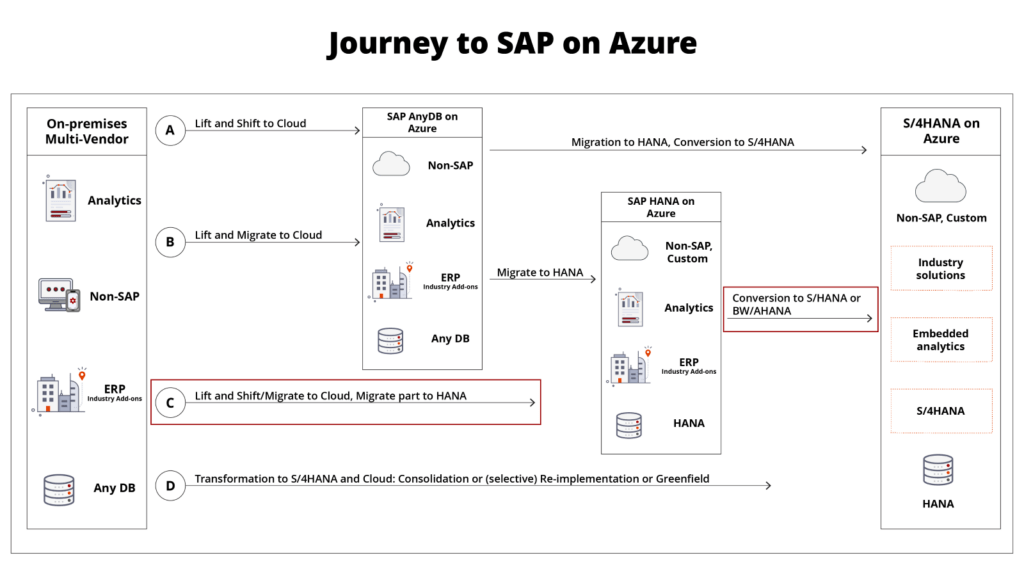SAP on Azure: Deployment Options and Setup
In the ever-evolving digital landscape, businesses seek innovative technologies and cloud solutions to thrive in a competitive environment. This exclusive blog delves into the transformative power of three major players: SAP, Microsoft Azure, and SAP Business Technology Platform (BTP). Uniting the strengths of SAP’s enterprise solutions, Azure’s cloud capabilities, and BTP’s comprehensive suite of services, this dynamic trio enables enterprises to harness cutting-edge technologies, drive innovation, and accelerate digital transformation. From exploring the journey of SAP and Microsoft’s collaboration to understanding the basics of Microsoft Azure and SAP BTP.
But that’s not all! In this blog, we’ll walk you through the process of setting up SAP on Azure, providing valuable tips and best practices to ensure a seamless transition towards becoming an intelligent enterprise.
So, if you’re ready to embrace innovation, to reimagine how your business operates, and to unlock the true potential of your data assets, then fasten your seatbelts and join us on this exciting journey. Let’s venture into the world of SAP, Microsoft Azure, and SAP Business Technology Platform, where endless possibilities await, and digital transformation knows no bounds. Together, let’s forge a path towards a brighter, more innovative future!
The Journey of SAP and Microsoft
The collaboration between SAP and Microsoft began in the early 1990s, with the integration of SAP applications with Microsoft’s operating systems and productivity tools. This marked the beginning of a long-standing relationship focused on delivering value to customers through a powerful combination of enterprise software and user-friendly interfaces.
As cloud computing gained momentum, both SAP and Microsoft recognized its potential in driving digital transformation. They expanded their collaboration to offer SAP applications on Microsoft Azure, a strategic move enabling businesses to accelerate their migration to the cloud, gaining scalability, agility, and cost efficiencies.
Embracing intelligent technologies like Artificial Intelligence (AI), Machine Learning (ML), and Internet of Things (IoT), SAP and Microsoft integrated these capabilities into SAP applications, empowering customers with enhanced analytics, predictive insights, and intelligent automation for data-driven decisions.
The partnership also focused on developing industry-specific solutions, tailoring offerings to meet unique needs across manufacturing, healthcare, retail, finance, and more. Additionally, the collaboration empowered developers with tools and resources to build custom applications and extensions, fostering a culture of innovation and agility.
SAP Business Technology Platform Basics
SAP Business Technology Platform (BTP) serves as the foundation for various SAP solutions, empowering businesses to build, extend, and integrate applications seamlessly. This comprehensive suite of services includes:
SAP Cloud Platform: Offering scalability and flexibility, this platform-as-a-service (PaaS) supports application development, integration, and deployment.
SAP Data Warehouse Cloud: A cloud-based data warehousing solution enabling users to consolidate, analyze, and visualize data from diverse sources.
SAP Integration Suite: Streamlining integration between SAP and non-SAP systems, enabling seamless data flow and process automation.
SAP Analytics Cloud: Providing advanced analytics and business intelligence capabilities to gain insights from data for informed decision-making.
SAP Extension Suite: Supporting the development of custom applications and extensions to enhance existing SAP solutions.
SAP Intelligent Robotic Process Automation: Empowering automation of repetitive tasks through software robots, increasing efficiency and reducing errors.
SAP Mobile Services: Facilitating the development and management of mobile applications, delivering a seamless user experience across devices.
Microsoft Azure Basics and Setup
Microsoft Azure is a leading cloud platform renowned for its global reach, scalability, and robust security. With a comprehensive suite of services, businesses can leverage Azure for a wide range of needs. Key features include:
Virtual Machines (VMs): Offering flexible application deployment, users can create and manage VMs to run applications in a scalable environment.
Azure App Service: Enabling businesses to build, deploy, and scale web apps, APIs, and mobile backends with ease.
Azure Storage: Securely store and access data with various options like Blob storage, Table storage, and File storage.
Azure SQL Database: A managed relational database service with high availability and intelligent optimization.
Azure Functions: Providing serverless computing for executing code in response to events without managing infrastructure.
Azure Cognitive Services: Access to pre-built AI models for vision, speech, language, and search capabilities.
Azure Virtual Network: Creating private and secure network connections for Azure resources.
The moment we’ve all been eagerly waiting for has arrived! Brace yourselves as we dive into the heart of this blog, where we unveil the incredible benefits and step-by-step process of setting up SAP S/4HANA on the mighty Microsoft Azure.
Are you ready to take the leap? Let’s go!
SAP S/4HANA: Empowering Intelligent Enterprises:
SAP S/4HANA is an advanced ERP suite built on the SAP HANA in-memory database, offering real-time analytics, improved data processing, and simplified business processes. Its modern architecture, supports innovation and digital transformation, enabling businesses to streamline operations and gain a competitive edge in today’s fast-paced market.
Why Choose Microsoft Azure for SAP S/4HANA?
Choosing Microsoft Azure as the platform for hosting SAP S/4HANA offers several compelling benefits:
Performance and Scalability: Microsoft Azure provides a high-performance, global network of data centres that ensures low-latency access to SAP S/4HANA applications. The platform’s scalable infrastructure allows businesses to handle peak workloads efficiently and easily adapt to changing demands.
Certified and Compliant: Azure is a certified platform for running SAP S/4HANA, meeting stringent performance goals and security standards set by SAP. This certification ensures that businesses can run their critical SAP applications in a secure and compliant environment.
Enhanced Security: Azure prioritizes security and offers robust measures, including data encryption, network security protocols, and multi-factor authentication. Regular updates and audits help protect against evolving cyber threats and safeguard sensitive business data.
Integration with Microsoft Services: By choosing Azure, businesses gain access to a wide array of Microsoft services and tools that integrate seamlessly with SAP S/4HANA. Azure Active Directory, Azure Backup, and Azure Monitor are just a few examples that optimize workflows and enhance user experiences.
Cost-Effectiveness: Azure’s flexible pricing model allows businesses to pay for resources based on their actual usage. This pay-as-you-go approach, combined with the ability to scale resources as needed, helps optimize costs while meeting performance requirements.
High Availability and Disaster Recovery: Azure’s infrastructure ensures high availability for SAP S/4HANA applications. Businesses can leverage built-in disaster recovery capabilities, such as Azure Site Recovery, to create reliable disaster recovery plans, minimizing downtime and data loss in case of unexpected events.
In summary, Microsoft Azure’s robust, secure, and scalable cloud infrastructure, along with its seamless integration with SAP applications and cost-effective pricing model, makes it an excellent choice for hosting SAP S/4HANA.
SAP S/4HANA Deployment Options on Azure:
There are two primary deployment options for SAP S/4HANA on Azure:
SAP S/4HANA on Azure Virtual Machines: In this option, SAP S/4HANA runs on Azure Virtual Machines (VMs), providing full control over the SAP environment and the underlying infrastructure.
SAP S/4HANA on Azure HANA Large Instances (HLI): HLI offers a dedicated, high-memory infrastructure optimized for SAP HANA workloads, delivering exceptional performance for SAP S/4HANA applications.
To set up SAP on Azure, businesses need to:
➔ Create a Microsoft Azure account and choose the appropriate subscription based on their needs.
➔ Select the desired deployment option for SAP S/4HANA: Azure Virtual Machines (VMs) or Azure HANA Large Instances (HLI).
➔ Configure Azure Virtual Network (VNet) and subnets to establish a secure and isolated environment for SAP S/4HANA.
➔ Set up Azure Premium Storage for optimal performance and low-latency access to data.
➔ Implement Azure Backup and Site Recovery for data protection and business continuity.
➔ Install SAP S/4HANA on the chosen Azure infrastructure following SAP’s installation and configuration guidelines.
➔ Utilize Azure Monitoring and Azure Security Center to monitor the performance and security of the SAP environment.
➔ Businesses benefit from choosing Azure for SAP S/4HANA, leveraging scalability, high availability, data integration capabilities, and cost optimization through the pay-as-you-go model.
Empowering Your Cloud Journey
The integration of SAP, Microsoft Azure, and SAP BTP empowers businesses throughout their digital journey:
Scalable Innovation: By deploying SAP applications on Azure, enterprises gain scalability and flexibility to adapt to changing business needs.
Seamless Integration and Analytics: SAP BTP and Azure services enable seamless integration between systems and advanced analytics for data-driven decision-making.
AI-driven Automation: Leveraging SAP BTP’s intelligent capabilities and Azure Cognitive Services, businesses can automate repetitive tasks and enhance efficiency.
Developer Empowerment: The partnership between SAP and Azure fosters a thriving developer ecosystem, enabling developers to build custom applications and extensions, driving innovation and agility.
Conclusion
In conclusion, the triumphant collaboration of SAP, Microsoft Azure, and SAP Business Technology Platform paves the way for businesses to become intelligent enterprises. Combining SAP’s industry-leading solutions, Azure’s powerful cloud infrastructure, and BTP’s extensive suite of services, organizations can drive innovation, optimize operations, and enhance customer experiences. Embrace this dynamic trio and propel your organization towards a future of innovation, growth, and success in the ever-changing digital landscape. For any queries or guidance feel free to contact us by clicking here.
FAQ’s
Why choose Azure for SAP S/4HANA deployment?
Azure offers scalable hosting for SAP S/4HANA, ensuring real-time analytics, robust security, and seamless integration, empowering businesses with high-performance cloud capabilities.
What deployment options exist for SAP S/4HANA on Azure?
Businesses can deploy SAP S/4HANA on Azure using Virtual Machines (VMs) or Azure HANA Large Instances (HLI), providing control or dedicated high-memory infrastructure, respectively.
What are the key benefits of the SAP, Azure, and SAP BTP collaboration?
This collaboration enables scalable innovation, seamless integration, AI-driven automation, and empowers developers, fostering agility and offering advanced analytics for data-driven decisions.
How does Azure enhance SAP S/4HANA hosting?
Azure ensures performance, global scalability, robust security, cost-effectiveness, high availability, disaster recovery, and compliance certifications, making it an optimal choice for SAP S/4HANA deployment.

